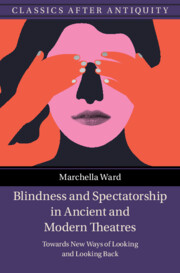 Blindness and Spectatorship in Ancient and Modern Theatres
Blindness and Spectatorship in Ancient and Modern Theatres Book contents
- Blindness and Spectatorship in Ancient and Modern Theatres
- Classics after Antiquity
- Blindness and Spectatorship in Ancient and Modern Theatres
- Copyright page
- Dedication
- Contents
- Figures
- Acknowledgements (Situating Knowledges)
- Notes on the Text
- Introduction: Looking and Looking Back
- Chapter 1 Towards Visual Activism
- Chapter 2 Blindness and / as Punishment
- Chapter 3 Blindness as Metaphorical Death
- Chapter 4 Blindness as Second Sight
- Interlude: Colonial Visions
- Chapter 5 Blindness and Spectatorship
- Conclusion: Assembling the Future
- Bibliography
- Index
Chapter 1 - Towards Visual Activism
Published online by Cambridge University Press: 30 November 2023
- Blindness and Spectatorship in Ancient and Modern Theatres
- Classics after Antiquity
- Blindness and Spectatorship in Ancient and Modern Theatres
- Copyright page
- Dedication
- Contents
- Figures
- Acknowledgements (Situating Knowledges)
- Notes on the Text
- Introduction: Looking and Looking Back
- Chapter 1 Towards Visual Activism
- Chapter 2 Blindness and / as Punishment
- Chapter 3 Blindness as Metaphorical Death
- Chapter 4 Blindness as Second Sight
- Interlude: Colonial Visions
- Chapter 5 Blindness and Spectatorship
- Conclusion: Assembling the Future
- Bibliography
- Index
Summary
Chapter One makes the case for a new way of seeing. Leaning on bell hooks and Rosemarie Garland-Thomson’s advocacy for an activist type of looking, it sets up some ways we might begin to read against – rather than with – the dominant narratives about disability. This chapter makes the first in a series of connections between classicism and coloniality that will recur in this book, and sees the process of reading bodies for meaning as rooted in colonial eugenics as well as classically-inspired physiognomy. Crucially for the argument of the book, the chapter concludes that reading bodies for meaning is neither a wholly classical nor a wholly colonial practice – and results instead from a particular way of looking back (or a linear inheritance model of classical reception). In closing, it introduces Michael Rothberg’s concept of the ‘implicated spectator’ as a way to return agency to the spectator in an assemblage-thinking model.
Keywords
- Type
- Chapter
- Information
- Blindness and Spectatorship in Ancient and Modern TheatresTowards New Ways of Looking and Looking Back, pp. 36 - 74Publisher: Cambridge University PressPrint publication year: 2023
